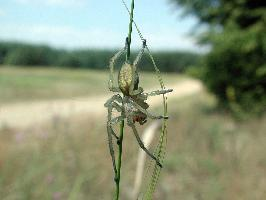
Állatleírás
The Yellow Sac Spider, scientifically known as Cheiracanthium punctorium, is a fascinating creature that has garnered attention due to its distinctive characteristics and behavior. This species belongs to the family Miturgidae and is primarily found in various parts of Europe and Asia, with its presence notably recognized in gardens, forests, and sometimes within human dwellings.Physically, the Yellow Sac Spider possesses a slender body that can range in color from a pale yellow to a greenish-yellow, providing it with a degree of camouflage among foliage and undergrowth. Adult spiders typically measure between 7 to 10 millimeters in length, with females generally being larger than males. One of the most distinguishing features of this species is its long, thin legs, which not only aid in its agile movements but also in the construction of its silk sacs, from which it derives its common name.
The behavior of the Yellow Sac Spider is particularly intriguing. It is a nocturnal hunter, relying on the cover of darkness to stalk its prey. Unlike many spiders that use webs to capture food, the Yellow Sac Spider actively hunts down its victims, which include a variety of insects and occasionally other spiders. During the day, it retreats to its silk sac—a small, tubular shelter that it constructs in secluded locations, such as under leaves, bark, or within the corners of buildings.
The silk sac serves multiple purposes; it is not only a hiding spot but also a place for the spider to rest, molt, and lay its eggs. Females lay eggs within these sacs, where they remain protected until hatching. The maternal instincts of the Yellow Sac Spider are notable, as the female often stays close to the sac to guard her offspring.
The bite of the Yellow Sac Spider is another aspect that has drawn attention. While not aggressive by nature, it will bite in self-defense if threatened or pressed against human skin. The venom of Cheiracanthium punctorium can cause mild to moderate reactions in humans, typically resulting in localized pain, swelling, and occasionally, necrotic lesions, although such severe reactions are rare. It's important to note that the spider's venom is not considered dangerous to humans, and serious complications are exceedingly uncommon.
In terms of its ecological role, the Yellow Sac Spider plays a significant part in controlling insect populations, making it a beneficial predator in its natural habitat. Its presence in agricultural and garden settings is often welcomed by farmers and gardeners alike for its pest control capabilities.
Despite its benefits, the Yellow Sac Spider's tendency to venture into human dwellings can lead to unease or fear among residents. However, understanding the behavior and ecological importance of this species can foster a more harmonious coexistence with these misunderstood creatures.
In summary, the Yellow Sac Spider, Cheiracanthium punctorium, is a remarkable species with a unique set of characteristics that distinguish it from other spiders. Its role as a nocturnal predator, combined with its distinctive yellow coloring, silk sac construction, and interaction with humans, makes it a subject of interest and study within the field of arachnology and beyond.
Új állatfotók
Top 10 állat
- Dolphin gull (Leucophaeus scoresbii)
- Japanese macaque (Macaca fuscata)
- Stone loach (Barbatula barbatula)
- Galápagos tortoise (Geochelone nigra complex)
- Russian tortoise (Testudo horsfieldii)
- Diana monkey (Cercopithecus diana)
- Greek tortoise (Testudo graeca)
- Common flying dragon (Draco volans)
- Moustached guenon (Cercopithecus cephus)
- Galápagos penguin (Spheniscus mendiculus)